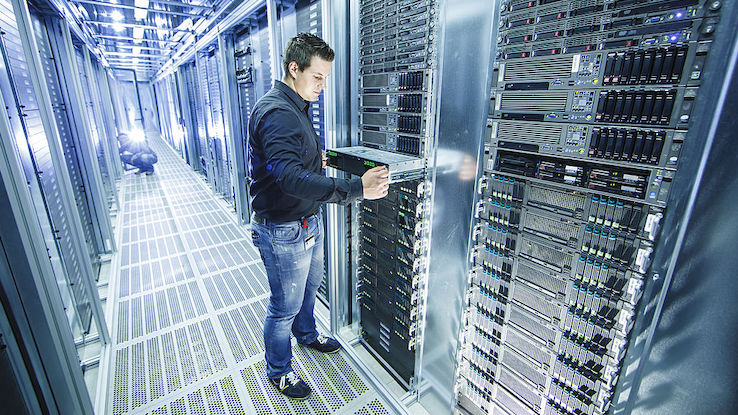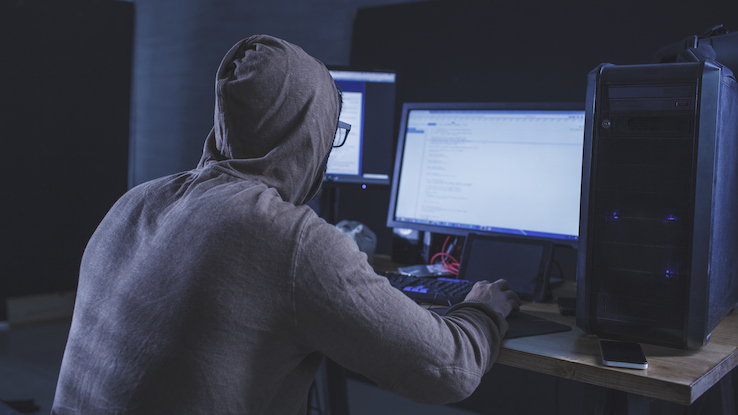How To Find Other Computers On Your Network

Security and privacy are big concerns these days, particularly when it comes to dealing with sensitive information on the internet. From passwords to credit card details, there are lots of details you want to go on safety — and that's especially true if you're running a business concern and need to keep clients' details safe. But even if y'all don't provide this blazon of information online, you notwithstanding take a correct to privacy. Y'all're allowed to remain anonymous if you want to, whether that's to protect your identity from hackers or only to relish more than peace of mind.
Interested in maintaining your anonymity online? That'southward where a virtual private network, or VPN, comes in. Learn more about this privacy tool, including how it works and how it can keep you safer while using the net.
The Basics of Sending Information Online
To sympathize how a VPN works, it also helps to know a little bit about how the cyberspace itself works. The internet is made upwardly of massive networks of interconnected machines called servers, which store, procedure and display website data to users. When you type in a website address, perform a search or otherwise admission sites and data online, the data y'all input to practise so travels to the server in what's called a parcel.

The packet includes details for the server about how to process your request, and this information also makes your internet protocol (IP) address available. This is an identifying number that belongs to your estimator and to any devices using your internet service to scan online (they each accept their own IP addresses). Any data that's associated with action coming from your IP address can be visible to other people who are accessing the same internet network as yous and to your internet service provider. The aforementioned is true for unsecured and public networks, like that free Wi-Fi y'all apply downwardly at the local coffee shop.
So, as your computer is sending out packets and data to servers while yous use the internet, hackers can intercept those packets and get the information in them. That ways they can get your IP address and other sensitive information you might take provided, similar usernames and passwords. To prevent this from happening, you tin can use a VPN.
What Does a VPN Do?
VPNs protect the data you send by encrypting them. This means they convert your information into a different format that servers can still sympathize but hackers and others on your network can't. VPNs also make it harder for hackers to access the information you're sending in the commencement place.

Call up of information technology like this: A normal internet network is like a typical city street. Cars — or your packets — travel freely down the road, and drivers (some of whom are hackers) can run into each other and peradventure get out and shake their fists when they're experiencing road rage. A VPN, on the other hand, is like a private tunnel. When you're driving through it (sending packets with your data), other drivers tin't see y'all, and they'll have a much harder time stopping your car. Essentially, VPNs conceal all the information you send to a server when you're completing unlike tasks online. This helps keep your information out of the wrong hands.
How Do VPNs Work — and Assistance?
Remember how the internet is a connected network of servers, and when yous're not using a VPN, your information travel — relatively unprotected — to those servers to prove you dissimilar websites? VPNs work by inserting an extra server into the equation. Instead of traveling straight to a site'southward server, when you utilise a VPN, your data travels to the VPN's server. There, information technology's scrambled before being sent on to the destination server. This keeps the destination server — the site you're visiting or where you're entering personal details — from learning your information.

At that place are several benefits to this, aside from the fact that your personal information is more secure when you send it through a VPN. For one thing, VPN servers are located all over the world. That tin can make it appear to your destination website as though you lot're in a different state. Why would you want to do that? Information technology can get y'all cheaper prices on things like flights and hotel rooms, for one thing. Quotes for pricing for these services tin can vary widely past country considering of exchange rates and the value of local currency, so it's possible to get a amend bargain if the travel site thinks you're in a dissimilar land.
Another reason why it's helpful to use a VPN involves cookies — not the tasty kind. Cookies are small packets of data about you or your usage of a specific website that are stored in a place where your net browser tin access them. When you visit a website ofttimes, it accesses the cookie on each visit and "remembers" who you lot are. Information technology may as well save certain data you type into the website. The site may also collect other data about you, such as your location information, and use it for marketing purposes. Sometimes, however, websites sell these data. Governments can also request them and see the IP addresses associated with the information. If you're using a VPN, the associated IP accost comes from the VPN server, non your figurer, so VPNs also prevent the transfer of your personal information in a manner that maintains your privacy.
Source: https://www.questionsanswered.net/tech/virutal-private-network-vpn-defined?utm_content=params%3Ao%3D740012%26ad%3DdirN%26qo%3DserpIndex
Posted by: sandbergcasonctin.blogspot.com


0 Response to "How To Find Other Computers On Your Network"
Post a Comment